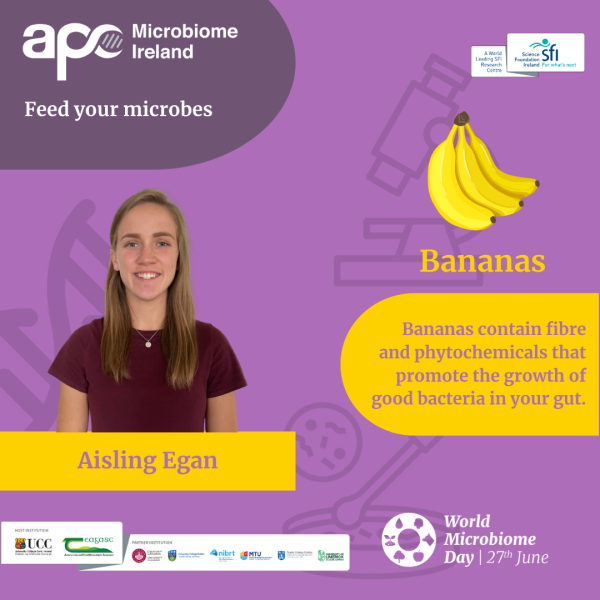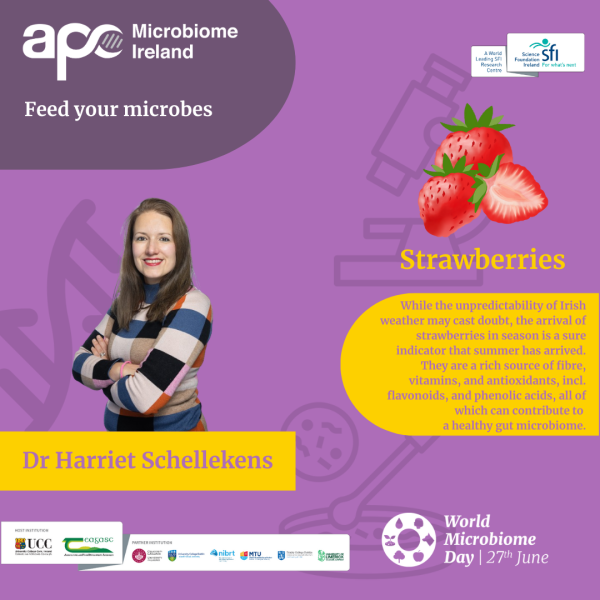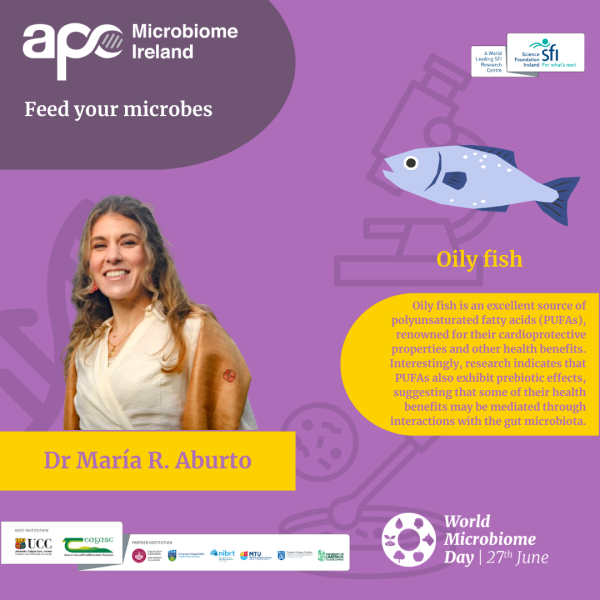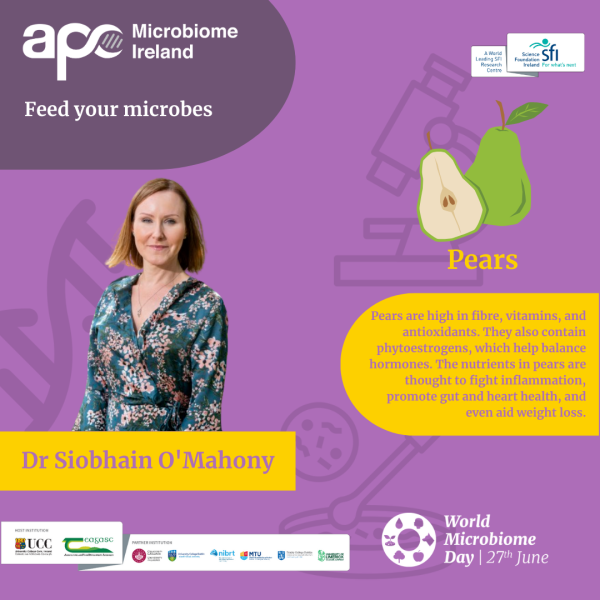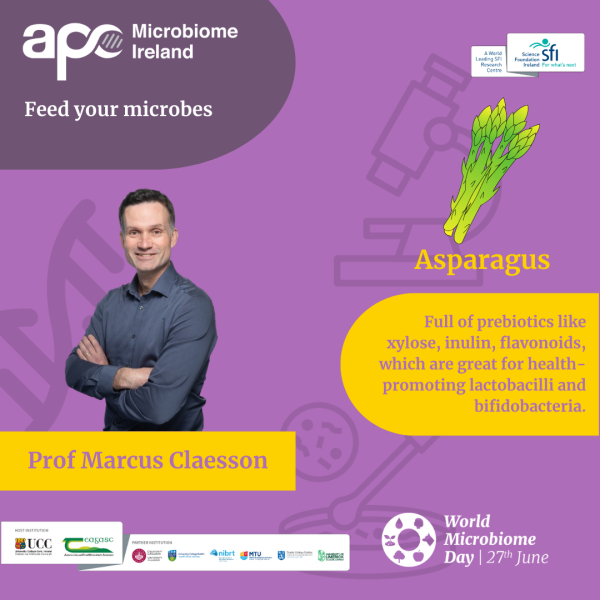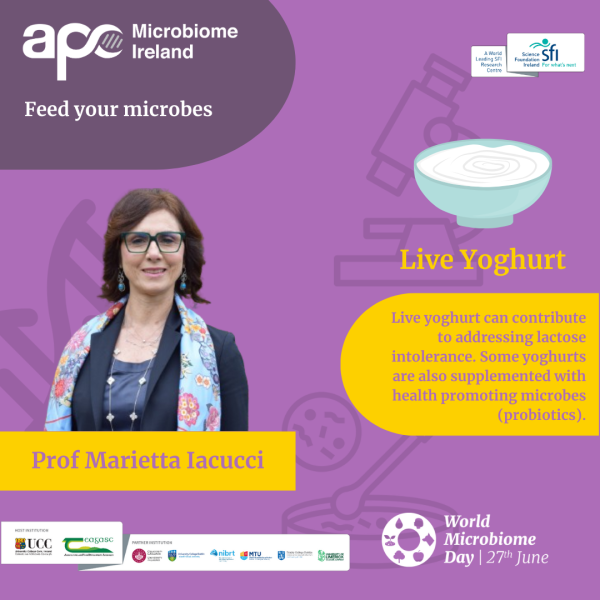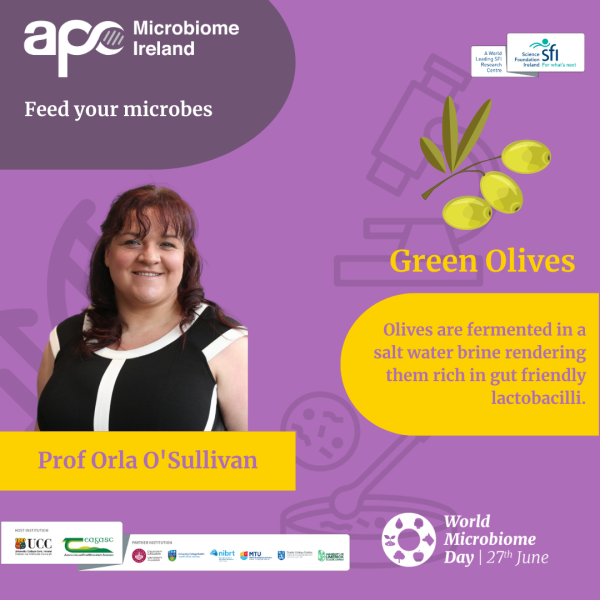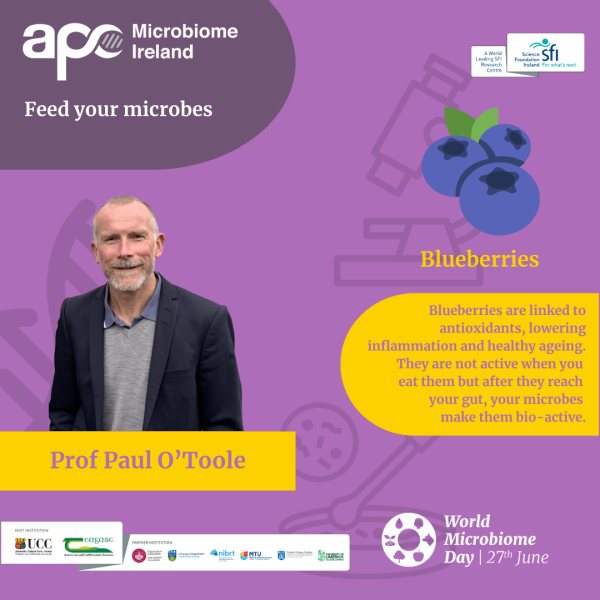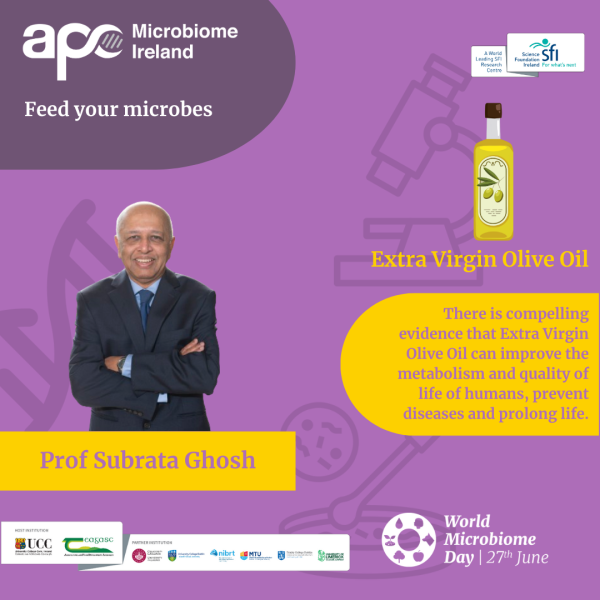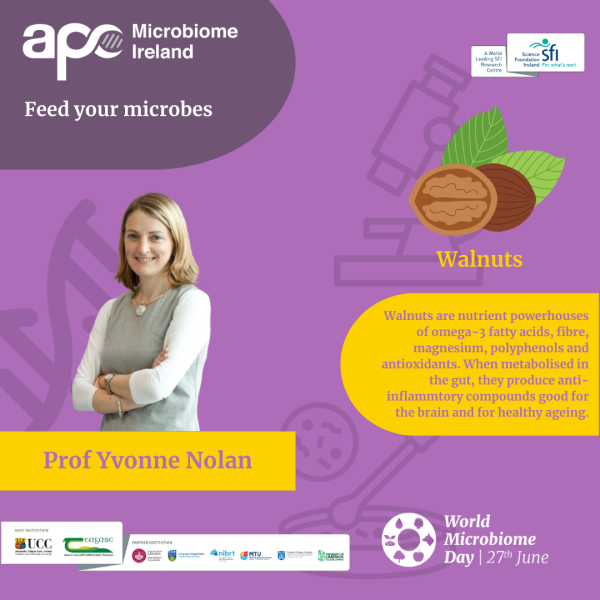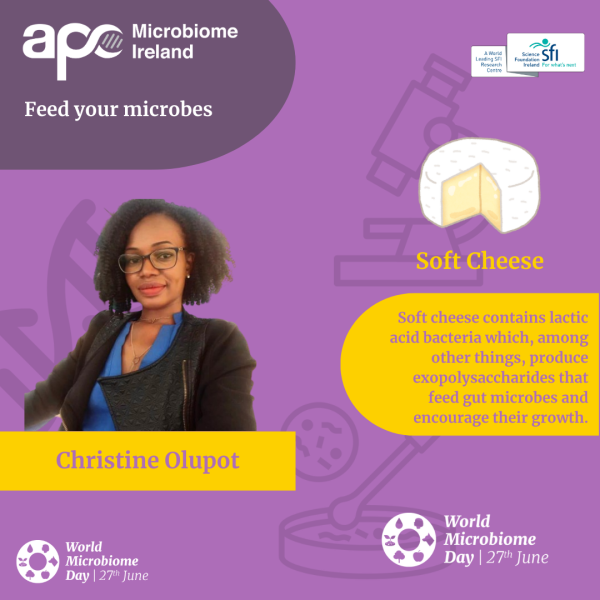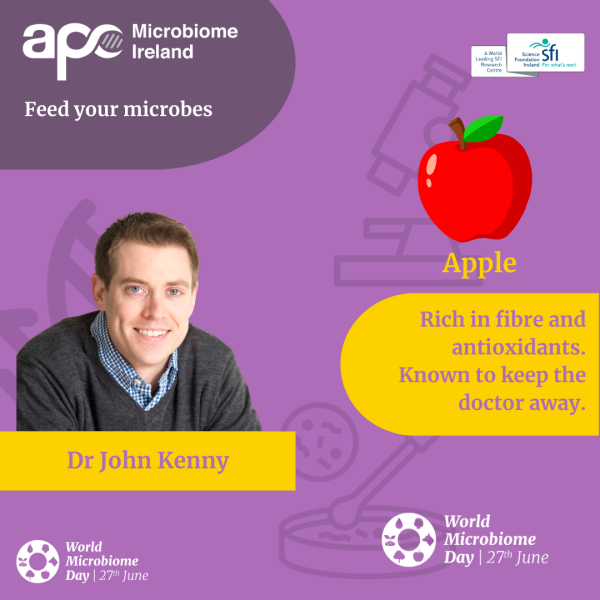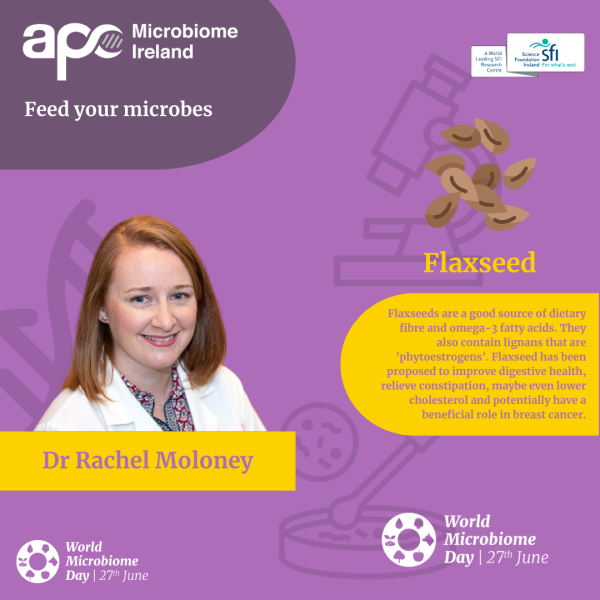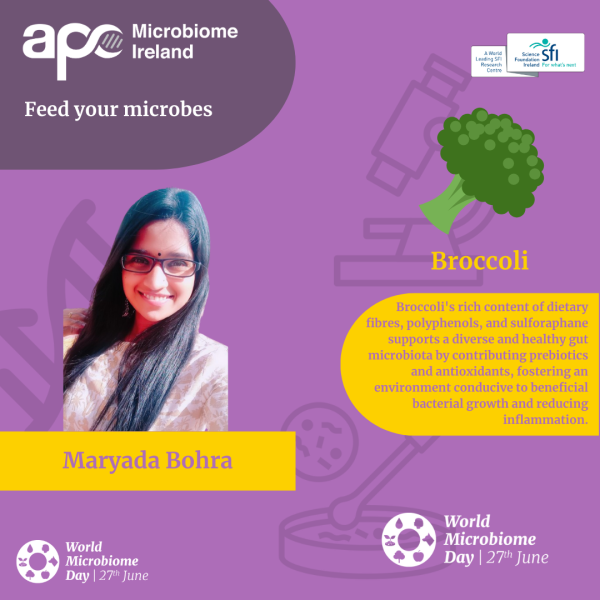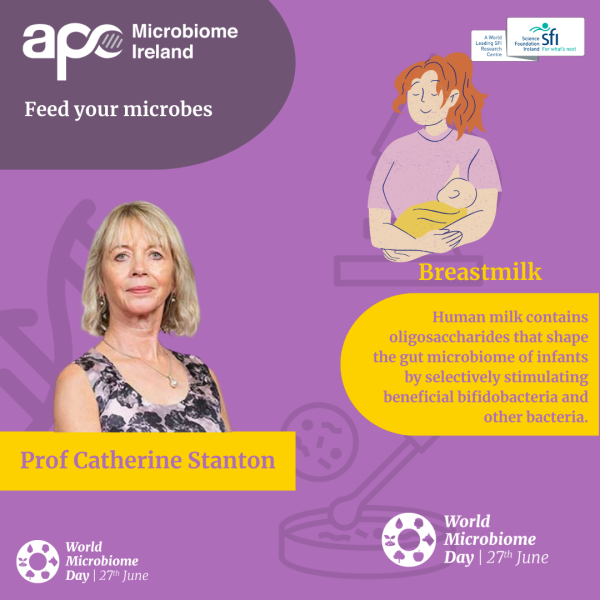| Researcher |
Food |
Rationale |
| Paul Ross |
Porridge |
Porridge contains beta glucan which increases the diversity of your gut microbes and promotes the growth of beneficial bacteria such as bifidobacteria in the colon. |
| Paul O’Toole |
Blueberries |
Blueberries are linked to antioxidants, lowering inflammation and healthy ageing. They are not active when you eat them but after they reach your gut your microbes make them bio-active. |
| Christine Olupot |
Soft Cheese |
Soft Cheese contains lactic acid bacteria which, among other things, produce exopolysaccharides that feed gut microbes and encourage their growth. |
| John Morrissey |
Kefir |
Kefir is good for your microbes because it contains a unique combination of good yeast and bacteria as well as the nutrients that support their beneficial activities in the gut. |
| Marcus Claesson |
Asparagus |
Full of prebiotics like xylose, inulin, flavonoids which are great for health-promoting lactobacilli and bifidobacteria. |
| Douwe Van Sinderen |
Cereals |
Cereals are good for your microbes because they contain arabinoxylan which stimulates specific bifidobacteria than then produce health promoting breakdown products and the slow release of energy. |
| Gerald Fitzgerald |
Onions |
Onions are good for microbes because they have prebiotic components which will contribute to the growth of bifidobacteria. Also tastes great roasted with Parmesan! |
| Jens Walter |
Beans |
Beans are beneficial to microbes because they are full of fibre which can change the metabolic profile of the gut microbiome in a positive way. |
| Subrata Ghosh |
Extra Virgin Olive Oil |
There is compelling evidence that Extra Virgin Olive Oil can improve the metabolism and quality of life of humans, prevent diseases and prolong life. |
| Marietta Iacucci |
Live Yoghurt |
Live yoghurt can contribute to addressing lactose intolerance. Some yoghurts are also supplemented with health promoting microbes (probiotics). |
| Harriet Schellekens |
Strawberries |
While the unpredictability of Irish weather may cast doubt, the arrival of strawberries in season is a sure indicator that summer has arrived. They are a rich source of fibre, vitamins, and antioxidants, incl. flavonoids, and phenolic acids, all of which can contribute to a healthy gut microbiome. |
| Paul Cotter |
Kombucha |
Kombucha is a fermented drink, normally made from black tea, sugar and a SCOBY (Symbiotic Culture Of Bacteria and Yeast). It can contain flavonoids, vitamins, and other bioactive compounds that can exert antioxidant, antimicrobial and other beneficial effects. |
| Eibhlís O’Connor |
Pulses (lentils, peas, beans) |
Packed with protein, prebiotic, soluble fibre, vitamins, minerals (iron, zinc, folate, magnesium), phytochemicals and polyphenols these are helpful to maintain a healthy blood lipid profile, improve transit time and maintain satiation. |
| Liam O’Mahony |
Peanuts & Treenuts |
Consumption early in life protects against food allergies, possibly by feeding the beneficial members of the infant microbiota |
| Gerard Clarke |
Fennel |
The fennel bulb is high in fibre |
| Orla O’Sullivan |
Green Olives |
Olives are fermented in a salt water brine rendering them rich in gut friendly lactobacilli. |
| Maryada Bohra |
Broccoli |
Broccoli’s rich content of dietary fibres, polyphenols, and sulforaphane supports a diverse and healthy gut microbiota by contributing prebiotics and antioxidants, fostering an environment conducive to beneficial bacteria growth and reducing inflammation. |
| Siobhain O’;Mahony |
Pears |
Pears are high in fibre, vitamins, and anti-oxidants. They also contain phytoestrogens, which help balance hormones. The nutrients in pears are thought to fight inflammation, promote gut and heart health, and even aid weight loss. |
| Yvonne Nolan |
Walnuts |
Walnuts are nutrient powerhouses of omega-3 fatty acids, fibre, magnesium, polyphenols and antioxidants. When metabolised in the gut, they produce anti-inflammtory compounds good for the brain and for healthy ageing. |
| Aisling Egan |
Bananas |
Bananas contain fibre and phytochemicals which promote the growth of good bacteria in your gut. |
| María R. Aburto |
Oily fish |
Oily fish is an excellent source of polyunsaturated fatty acids (PUFAs), renowned for their cardioprotective properties and other health benefits. Interestingly, research indicates that PUFAs also exhibit prebiotic effects, suggesting that some of their health benefits may be mediated through interactions with the gut microbiota. |
| Rachel Moloney |
Flaxseed |
Flaxseeds are a good source of dietary fibre and omega-3 fatty acids. They also contain lignans which are ‘phytoestrogens’. Flaxseed has been proposed to improve digestive health, relieve constipation, maybe even lower cholesterol and potentially have a beneficial role in breast cancer. |
| John Kenny |
Apple |
Rich in fibre and antioxidants. Known to keep the doctor away. |
| Catherine Stanton |
Breastmilk |
Human milk contains oligosaccharides that shape the gut microbiome of infants by selectively stimulating beneficial bifidobacteria and other bacteria. |
